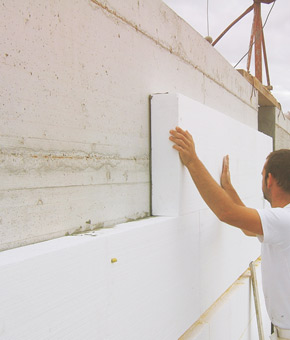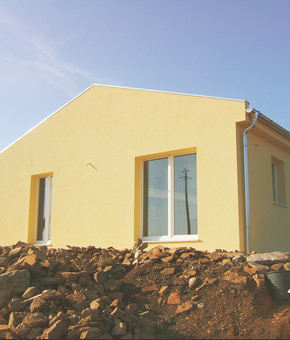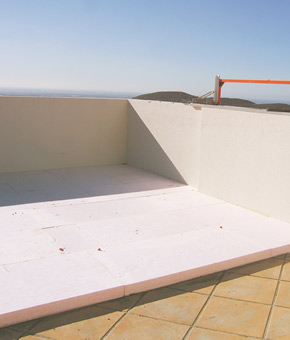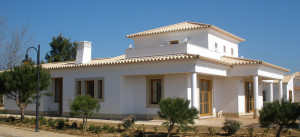Thermal Insulation | RenoBuild Algarve



Thermal Insulation
The increase of comfort requirements together with the need to control energy usage provides special importance to buildings’ thermal performance and energy efficiency.
With over 35 years of experience in the implementation of thermal insulation systems, RenoBuild has at its disposal a set of solutions to improve the comfort of your home and reduce energy consumption. Amongst the various insulation systems that we have at your disposal we highlight the following:
- Insulation of Walls
- Insulation of Roofs
MATERIALS FOR THERMAL AND ACOUSTIC INSULATION
Insulating, ventilating and heating/cooling are three crucial factors to obtain a healthy and comfortable atmosphere. Insulating a house effectively allows saving in heating (winter) and cooling (summer), guaranteeing a pleasant temperature during the whole year at lower costs.
There is a great diversity of products for thermal and acoustic insulation. The process of deciding on solutions and type of materials to apply, besides the technical-financial analysis, requires bearing in mind the part of the house to insulate, the type of insulation desired, as well as issues of durability and sustainability. As for their origin, insulating materials may be divided, fundamentally, into 3 groups: mineral, vegetal and synthetic materials.
Thermal Insulation of Walls
Buildings’ energy performance is strongly influenced by the thermal behavior of facades. Therefore, enhancing the thermal insulation of exterior walls or walls connected to not heated spaces lead to an increase in thermal comfort and reduced energy consumption.
External Thermal Insulation (ETICS)
RenoBuild has an extensive experience in the application of ETICS systems (External Thermal Insulation Composite System), having performed thousands of square meters of facades, both in new and existing constructions. ETICS systems from the reference brands STO and Fassa Bortolo are at your disposal. These systems stand out due to the possibility of finishings without joints, impermeability to heavy rains and good water vapour permeability.
Many advantages come from using the ETICS system:
- Correction of thermal bridging;
- Decreased risk of superficial and internal condensation (that cause the appearance of molds and fungus);
- Energy savings;
- Increase of the interior thermal inertia of buildings;
- Protection of facades to the atmospheric agents action;
- Increase of the market value and durability of constructions;
- Reduced nuisance to the building occupants during application;
- Wide range of finishing solutions.
Internal Thermal Insulation
In some cases, external thermal insulation is prevented by the existing constraints of the building. In such situations, we may choose various internal insulation solutions which will improve the thermal behavior. In these cases we may choose from several internal insulation solutions that allow improving the thermal performance, combining the aforementioned insulating materials with gypsum board plates. Some of the thermal insulation solutions also allow improving the acoustic performance of the intervened space.
Thermal Insulation of Roofs
The roof is the area that is subject to greater temperature variations. Therefore, thermal insulation of the roof is a priority measure when improving thermal comfort and energy efficiency of a dwelling.
RenoBuild has an extensive experience in the application of various solutions of roofing insulation, either in horizontal roofs (inverted roofs, terraces) as on sloped roofs (mat slab, insulation of sloped sides).
ECOLOGICAL THERMAL INSULATION AND ACOUSTIC INSULATION WITH CORK
Expanded Insulation Corkboards are made of a totally natural and renewable raw material – cork, extraction of which from the tree is part of its life cycle. Among the advantages of using cork note the following: 100% natural product; Very low embodied energy; Thermal Insulation, Acoustic and anti-vibration simultaneously; High dimensional stability; Almost unlimited durability, keeping technical features; Promotes thermal lag; Permeable to water vapour; In case of fire it does not release toxic gases; Does not react to chemical agents; not attackable by rodents; 100% Recyclable and Reusable in other applications.
Thermal Insulation: Ability of the material to retain the passage of heat / cold. The Expanded Insulation Corkboard has the characteristic of low thermal conductivity combined with a slow and gradual release of this heat / cold to the interior / exterior (high thermal inertia).
Anti-vibration Insulation: Ability of a material when subjected to loads have a natural tendency to recovery (resilience) to help prevent the spread of vibration over a given surface to be transmitted to the contiguous space.
Acoustic Insulation: Ability of a material to absorb the sound waves transforming them into energy and releasing only a remnant. This difference between the absorption capacity and the initial value of the noise results in an acoustic insulation. The Expanded Insulation Corkboard can be used as material for the correction of acoustic environments and when in a constructive solution, as an important acoustic insulation.
Aware of the importance of sustainable construction practices, RenoBuild offers the possibility of thermal and acoustic insulation of your home with cork (Roofs, Floors, Ceilings and Walls).
Reference to RenoBuild on Website of STO Supplier in Portugal

“ETICS systems (External Thermal Insulation Composite System
Project “Alma Verde” is located in Western Algarve, in the municipality of Vila do Bispo. It is formed by several ecological dwellings and has already won 23 awards for energetic efficiency, sustainability, architecture and innovation. In Project Alma Verde, Renobuild applied the ETICS systems (External Thermal Insulation Composite System) – StoThermClassic –of several buildings.”
“STO was the first building products manufacturer to design and produce external wall insulation systems. Still regarded as the industry benchmark over 50 years later, StoTherm Classic has undergone five decades of development and refinement to meet the demands of modern construction and the need to reduce energy consumption around the globe.”
Algarve: Portimão • Lagos • Lagoa • Carvoeiro • Aljezur • Sagres • Monchique • Silves • Albufeira